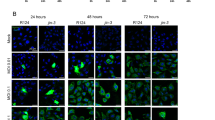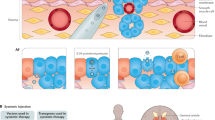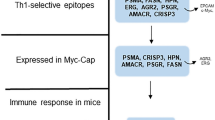Abstract
Gene therapy strategies based on modifying tumour cells using high efficiency adenoviral vectors have shown promise in the clinic. Recently the Coxsackie and adenovirus receptor (CAR) has been shown to mediate adenoviral entry into tumour cells, although previous studies also suggested a role for MHC class I heavy chain. Detailed evaluation of the expression of both CAR and MHC class I in prostate cancer cell lines would have important implications for therapeutic strategies. We have found that, unlike cell lines derived from other malignancies, in human and murine prostate cancer loss of CAR expression appears to be relatively infrequent and does not correlate with loss of MHC class I expression. These findings, together with the demonstration of appreciable levels of cell-surface expression of integrins, suggest that cancer vaccine strategies based on modifying whole prostate cancer cells should be feasible using the current generation of recombinant adenoviral vectors, without deleterious effects on either the virus vector or the target cell.
This is a preview of subscription content, access via your institution
Access options
Subscribe to this journal
Receive 4 print issues and online access
$259.00 per year
only $64.75 per issue
Buy this article
- Purchase on Springer Link
- Instant access to full article PDF
Prices may be subject to local taxes which are calculated during checkout

Similar content being viewed by others
References
Hodi FS, Dranoff G . Genetically modified tumor cell vaccines. Surg Oncol Clin N Am 1998; 7: 471–485.
Hellstrom I, Hellstrom KE . Tumor vaccines—a reality at last? J Immunother 1998; 21: 119–126.
Mastrangelo MJ, et al. Cellular vaccine therapies for cancer. Cancer Treat Res 1998; 94: 35–50.
Pardoll DM . Cancer vaccines. Nat Med 1998; 4 (5 Suppl): 525–531.
Smith AE . Viral vectors in gene therapy. A Rev Microbiol 1995; 49: 807–838.
Harrington KJ, et al. Gene therapy for prostate cancer: current status and future prospects. J Urol 2001; 166: 1220–1233.
Hutchin ME, Pickles RJ, Yarbrough WG . Efficiency of adenovirus-mediated gene transfer to oropharyngeal epithelial cells correlates with cellular differentiation and human coxsackie and adenovirus receptor expression. Hum Gene Ther 2000; 11: 2365–2375.
Russell WC . Update on adenovirus and its vectors. J Gen Virol 2000; 81 (Pt 11): 2573–2604.
Philipson L, Lonberg-Holm K, Pettersson U . Virus-receptor interaction in an adenovirus system. J Virol 1968; 2: 1064–1075.
Stevenson SC, et al. Human adenovirus serotypes 3 and 5 bind to two different cellular receptors via the fiber head domain. J Virol 1995; 69: 2850–2857.
Wickham TJ, Mathias P, Cheresh DA, Nemerow GR . Integrins alpha v beta 3 and alpha v beta 5 promote adenovirus internalization but not virus attachment. Cell 1993; 73: 309–319.
Bergelson JM, et al. Isolation of a common receptor for Coxsackie B viruses and adenoviruses 2 and 5. Science 1997; 275: 1320–1323.
Tomko RP, Xu R, Philipson L . HCAR and MCAR: the human and mouse cellular receptors for subgroup C adenoviruses and group B coxsackieviruses. Proc Natl Acad Sci USA 1997; 94: 3352–3356.
Hong SS, et al. Adenovirus type 5 fiber knob binds to MHC class I alpha2 domain at the surface of human epithelial and B lymphoblastoid cells. Embo J 1997; 16: 2294–2306.
McDonald D, et al. Coxsackie and adenovirus receptor (CAR)-dependent and major histocompatibility complex (MHC) class I-independent uptake of recombinant adenoviruses into human tumour cells. Gene Ther 1999; 6: 1512–1519.
Freimuth P, et al. Coxsackievirus and adenovirus receptor amino-terminal immunoglobulin V-related domain binds adenovirus type 2 and fiber knob from adenovirus type 12. J Virol 1999; 73: 1392–1398.
Bewley MC, et al. Structural analysis of the mechanism of adenovirus binding to its human cellular receptor, CAR. Science 1999; 286: 1579–1583.
Roelvink PW, et al. Identification of a conserved receptor-binding site on the fiber proteins of CAR-recognizing adenoviridae. Science 1999; 286: 1568–1671.
Hidaka C, et al. CAR-dependent and CAR-independent pathways of adenovirus vector-mediated gene transfer and expression in human fibroblasts. J Clin Invest 1999; 103: 579–587.
Kaner RJ, et al. Modification of the genetic program of human alveolar macrophages by adenovirus vectors in vitro is feasible but inefficient, limited in part by the low level of expression of the coxsackie/adenovirus receptor. Am J Respir Cell Mol Biol 1999; 20: 361–370.
Leon RP, et al. Adenoviral-mediated gene transfer in lymphocytes. Proc Natl Acad Sci USA 1998; 95: 13159–13164.
Stockwin L, et al. Engineered expression of the Coxsackie and adenovirus receptor (CAR) in human dendritic cells enhances recombinant adenovirus-mediated gene transfer. J Immunol Methods 2001. in press
Honda T, et al. The coxsackievirus-adenovirus receptor protein as a cell adhesion molecule in the developing mouse brain. Brain Res Mol Brain Res 2000; 77: 19–28.
Yamamoto H, et al. Association of reduced cell adhesion regulator messenger RNA expression with tumor progression in human hepatocellular carcinoma. Int J Cancer 1997; 74: 251–254.
Brodsky FM, Bodmer WF, Parham P . Characterization of a monoclonal anti-beta 2-microglobulin antibody and its use in the genetic and biochemical analysis of major histocompatibility antigens. Eur J Immunol 1979; 9: 536–545.
Kimball ES, Fisher MC . Levamisole effects on major histocompatibility complex and adhesion molecule expression and on myeloid cell adhesion to human colon tumor cell lines. J Natl Cancer Inst 1996; 88: 109–116.
Hemmi S, et al. The presence of human coxsackievirus and adenovirus receptor is associated with efficient adenovirus-mediated transgene expression in human melanoma cell cultures. Hum Gene Ther 1998; 9: 2363–2373.
Li Y, et al. Loss of adenoviral receptor expression in human bladder cancer cells: a potential impact on the efficacy of gene therapy. Cancer Res 1999; 59: 325–330.
Miller CR, et al. Differential susceptibility of primary and established human glioma cells to adenovirus infection: targeting via the epidermal growth factor receptor achieves fiber receptor-independent gene transfer. Cancer Res 1998; 58: 5738–5748.
Scupoli MT, et al. Expression of MHC class I and class II antigens in pancreatic adenocarcinomas. Tissue Antigens 1996; 48 (4 Pt 1): 301–311.
Acknowledgements
LH and GEB were supported by a research grant from Yorkshire Cancer Research. JE was funded by Swire Group, London. HP is Hon. Simon Weinstock Senior Lecturer in Tumour Immunology and is funded by the Sobel Trust, UK. We thank Onyvax Ltd for kind access to prostate cancer cell lines.
Author information
Authors and Affiliations
Corresponding author
Rights and permissions
About this article
Cite this article
Pandha, H., Stockwin, L., Eaton, J. et al. Coxsackie B and adenovirus receptor, integrin and major histocompatibility complex class I expression in human prostate cancer cell lines: implications for gene therapy strategies. Prostate Cancer Prostatic Dis 6, 6–11 (2003). https://doi.org/10.1038/sj.pcan.4500611
Received:
Accepted:
Published:
Issue Date:
DOI: https://doi.org/10.1038/sj.pcan.4500611



